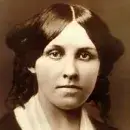
Louisa May Alcott
Louisa May Alcott is best known as the author of the novel Little Women (1868), a fictionalized version of her family’s life in Concord, Massachusetts, and its sequels Good Wives (1869), Little Men (1871), and Jo’s Boys (1886). Raised in New England by her transcendentalist parents, she grew up among many well-known intellectuals, including Margaret Fuller, Ralph Waldo Emerson, Nathaniel Hawthorne, and Henry David Thoreau. She first achieved critical success for Hospital Sketches (1863), a book of letters from her service as a nurse in the American Civil War.
Little Women follows the lives of the four March sisters–Meg, Jo, Beth, and Amy–and details their passage from childhood to womanhood, based on the lives of the author and her three sisters. The novel was an immediate commercial and critical success, and has since been translated into at least fifty languages.
According to literary historian Sarah Elbert, Alcott created a new form of literature, one that took elements from romantic children’s fiction and combined it with others from sentimental novels, resulting in a totally new genre. G. K. Chesterton believed that Little Women “anticipated realism by twenty or thirty years.”
Alcott was an abolitionist and a feminist. A friend of Frederick Douglass and William Lloyd Garrison, Alcott believed in the full integration of African Americans into society and wrote many anti-slavery stories, including “M. L.,” “My Contraband,” and “An Hour.” She was also active in reform movements such as temperance and women’s suffrage, and was the first woman to register to vote in Concord, Massachusetts, for a school board election in 1879.